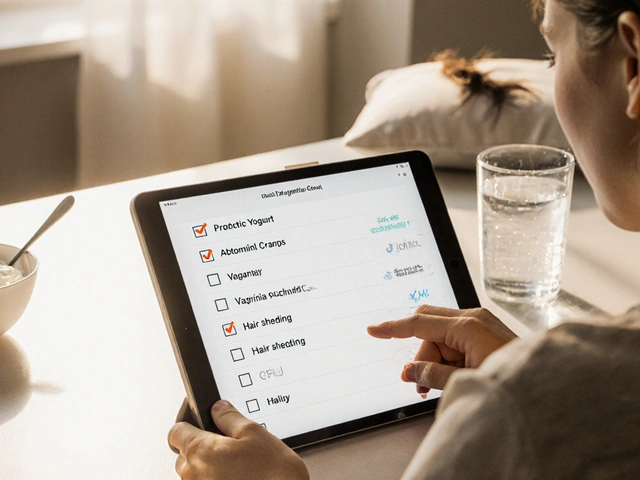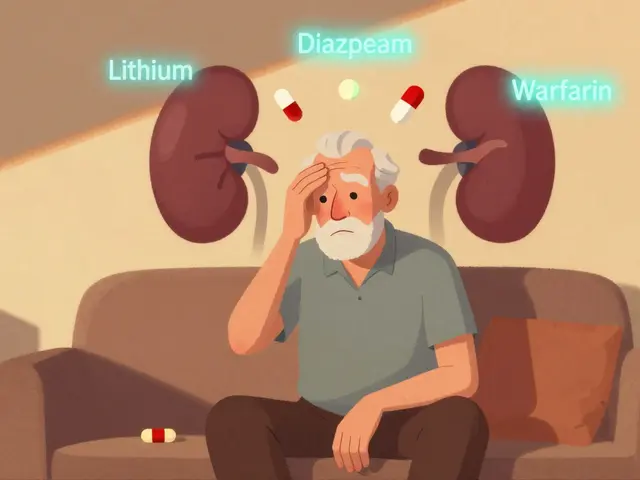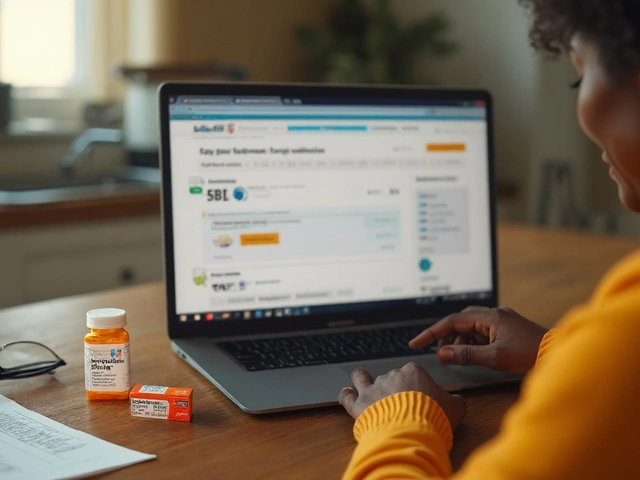What is Alfuzosin and Why It’s Prescribed
Alfuzosin is a selective alpha‑1 adrenergic receptor antagonist used primarily to relieve urinary symptoms caused by benign prostatic hyperplasia (BPH). By relaxing smooth muscle in the prostate and bladder neck, it improves urine flow and reduces urgency. The drug is taken once daily, typically at the same time each morning, and is marketed under brand names such as Uroxatral.
How Alfuzosin Works in the Body
Alfuzosin belongs to the alpha‑blocker class. It binds to alpha‑1A receptors located in the prostate, bladder neck, and urethra. Blocking these receptors prevents norepinephrine‑driven contraction, allowing the urinary tract to stay relaxed. Because it is more uroselective than older agents, the impact on blood pressure is generally milder-yet side effects still stem from its vasodilatory action.
Common Side Effects and Simple Ways to Tame Them
Most men experience only mild reactions. Below are the frequent culprits and quick fixes.
- Dizziness or light‑headedness: Often occurs when standing quickly. Mitigation = rise slowly, set the alarm to get up at night, and consider taking alfuzosin with food to blunt the peak plasma level.
- Headache: Hydration helps; a full glass of water with the dose can reduce the incidence. If headaches persist, an over‑the‑counter analgesic (acetaminophen) is usually safe.
- Fatigue: Schedule the dose for early morning when you’re naturally more awake. Avoid heavy meals right after dosing, as digestion can draw blood away from the brain.
- Runny or stuffy nose: This is a mild anticholinergic‑like effect. Saline nasal sprays or a short course of antihistamine (non‑sedating) can keep you comfortable.
These symptoms typically fade within two weeks as the body adjusts. If they linger beyond a month, contact your prescriber for a possible dose tweak.
Less Common but More Serious Reactions
While rare, certain adverse events demand prompt attention.
- Orthostatic hypotension: A sudden drop in blood pressure when standing, leading to faintness or falls. Management = raise the bed’s head a few inches, wear compression stockings, and monitor blood pressure at home. If systolic pressure falls below 90 mmHg, seek medical advice.
- Syncope (fainting): Similar triggers as orthostatic hypotension but may indicate a more pronounced vascular response. Immediate step = sit or lie down, elevate the legs, and call a clinician if episodes recur.
- Retrograde ejaculation: Seminal fluid moves backward into the bladder instead of out the urethra. This does not affect fertility in most cases, but men planning conception should discuss alternatives like tamsulosin, which has a lower incidence.
- Priapism (prolonged erection): Extremely uncommon, but if an erection lasts longer than four hours, emergency care is required to prevent tissue damage.
Drug Interactions and Contra‑indications You Should Know
Alfuzosin is metabolized by the liver enzyme CYP3A4. Anything that blocks or induces this enzyme can alter drug levels.
- Strong CYP3A4 inhibitors (e.g., ketoconazole, erythromycin, grapefruit juice) can raise alfuzosin concentrations, increasing side‑effect risk. Avoid these or ask your doctor for an adjusted dose.
- Potent CYP3A4 inducers (e.g., rifampin, carbamazepine) may reduce effectiveness, potentially worsening BPH symptoms.
- Nitrates (e.g., nitroglycerin) combined with alfuzosin can cause severe hypotension. The two classes should never be taken together.
- Other antihypertensives (beta‑blockers, diuretics) may amplify blood‑pressure‑lowering effects. Regular monitoring is advised when starting a new therapy.
Kidney or liver impairment, as well as a history of severe cardiovascular disease, are also red flags. In such cases, practitioners often start at a lower dose or choose an alternative medication.

Practical Strategies to Manage Side Effects
- Take with food: A light breakfast reduces the drug’s peak concentration, smoothing out dizziness and headache.
- Stay hydrated: Aim for 2-3 liters of water daily. Proper hydration keeps blood volume stable, lessening orthostatic drops.
- Monitor blood pressure: Use a home cuff each morning and before bedtime. Record the numbers; share trends with your pharmacist.
- Schedule dose timing: If nighttime dizziness is an issue, shift the dose to early afternoon; many patients tolerate the drug well as long as it’s taken at the same time each day.
- Combine with lifestyle tweaks: Limit alcohol, avoid high‑salt meals, and engage in gentle aerobic activity (e.g., walking) to improve circulatory stability.
- Communication loop: Keep a side‑effect diary (date, symptom, intensity). Bring it to each follow‑up visit for targeted adjustments.
How Alfuzosin Stacks Up Against Other Alpha‑Blockers
| Drug | Receptor Selectivity | Dosing Frequency | Typical Daily Dose | Common Side Effects |
|---|---|---|---|---|
| Alfuzosin | Uro‑selective (α1A/α1D) | Once daily | 10 mg | Dizziness, headache, fatigue |
| Tamsulosin | Highly uro‑selective (α1A) | Once daily | 0.4 mg | Retrograde ejaculation, dizziness |
| Doxazosin | Non‑selective (α1) | Once or twice daily | 4 mg | Orthostatic hypotension, dizziness |
Choosing the right agent hinges on personal tolerance, comorbid conditions, and convenience. Alfuzosin’s once‑daily schedule and moderate selectivity make it a solid middle‑ground choice for many men.
Related Concepts and Next Steps in BPH Care
Alfuzosin lives inside a broader treatment ecosystem. Understanding adjacent topics helps you make informed decisions.
- Benign Prostatic Hyperplasia (BPH): A non‑cancerous enlargement of the prostate gland that affects up to 30% of men over 60. Symptoms include weak stream, nocturia, and incomplete emptying.
- Prostate‑Specific Antigen (PSA) Testing: While not a direct side‑effect issue, regular PSA checks monitor for hidden prostate cancer, especially when using long‑term alpha‑blockers.
- Lifestyle Modifications: Reducing caffeine, limiting fluid intake before bedtime, and pelvic floor exercises can amplify medication benefits.
- Alternative Pharmacologic Options: 5‑α‑reductase inhibitors (e.g., finasteride) shrink the prostate over months and are sometimes combined with alfuzosin for severe cases.
- Surgical Interventions: Transurethral resection of the prostate (TURP) or newer laser therapies are options when medication fails.
After you’ve mastered side‑effect management, discuss these complementary strategies with your urologist to tailor a long‑term plan.
Key Takeaways
Alfuzosin is an effective, once‑daily alpha‑blocker for BPH, but it can cause dizziness, headache, and occasional blood‑pressure dips. Simple habits-taking the pill with food, staying hydrated, and rising slowly-prevent most issues. Be vigilant about drug interactions, especially with CYP3A4 inhibitors, and keep an open line with your healthcare team.
Frequently Asked Questions
Can I drink alcohol while taking alfuzosin?
Alcohol can amplify alfuzosin’s blood‑pressure‑lowering effect, increasing dizziness or faintness. One‑to‑two drinks occasionally are unlikely to cause trouble if you’re seated and well‑hydrated, but heavy or binge drinking should be avoided.
What should I do if I get a sudden headache after my dose?
First, drink a full glass of water and rest in a quiet room. If the headache persists after 30 minutes, take an acetaminophen (500‑1000mg). If headaches become frequent, let your prescriber know; a dose adjustment may be needed.
Is it safe to combine alfuzosin with a blood‑pressure medication?
Yes, but only under medical supervision. Alfuzosin can add to the hypotensive effect of ACE inhibitors, beta‑blockers, or diuretics. Your doctor will likely monitor your pressure more closely during the first two weeks.
Why does alfuzosin sometimes cause a runny nose?
The drug’s mild anticholinergic activity can trigger nasal secretions in sensitive individuals. Using a saline spray or a non‑sedating antihistamine usually eases the annoyance.
Can alfuzosin affect my sexual performance?
Rarely, it may cause retrograde ejaculation, where semen enters the bladder instead of exiting. This doesn’t impair the ability to have an erection or reach orgasm, but it can affect fertility. If planning a child, discuss alternatives with your urologist.
Should I stop alfuzosin before surgery?
Most surgeons ask patients to pause alfuzosin 24‑48hours before anesthesia to avoid unexpected blood‑pressure drops during the operation. Always confirm the timing with your surgical team.







lisa zebastian
22 September 2025 - 14:21 PM
Okay but let’s be real - this whole ‘uroselective’ thing is just Big Pharma’s way of selling you the same old alpha-blocker with a fancy label. CYP3A4? Please. They know grapefruit juice messes with it and still don’t put a warning on the bottle big enough to scare Grandma. And don’t even get me started on how they hide retrograde ejaculation under ‘common side effect’ like it’s a minor inconvenience. Bro, that’s not a side effect - that’s your reproductive system going rogue. And they wonder why men stop taking it.
Jessie Bellen
22 September 2025 - 19:33 PM
Stop taking it. Now. This drug is a gateway to low BP, weird ejaculation, and your doctor not listening. I’ve seen 3 guys on this turn into zombies. One fainted in the grocery store. Another lost his job because he couldn’t stand up without dizziness. They don’t tell you it’s not just ‘adjusting’ - it’s your body screaming for help. Wake up.
Jo Sta
23 September 2025 - 02:17 AM
Ugh. I took this for 3 weeks. Headache every day. Felt like my brain was in a vice. Took it with food? Yeah, right. I ate a bagel and still felt like I was gonna pass out walking to the fridge. Just give me a catheter already. At least then I’d know what’s going on.
Jasmine Kara
23 September 2025 - 14:33 PM
i just wanna say i started this last week and honestly? the dizziness got better after 5 days. i was scared at first but i just drank water like a maniac and sat down when i felt lightheaded. its not perfect but its way better than peeing every 20 mins. also i take it after breakfast now and no more headaches. just sayin’ 😅
arthur ball
23 September 2025 - 20:53 PM
Y’all are either freaking out or being way too chill. Look - this ain’t magic. It’s a tool. I’ve been on it for 8 months. Dizziness? Yeah, first week. Headache? Once. Retrograde? Oh yeah, but my wife and I laughed about it - it’s weird, not tragic. I drink water, I don’t chug coffee before bed, and I take it with my oatmeal. No drama. No panic. Just consistency. And if you’re scared of grapefruit? Don’t eat it. Simple. You don’t need a conspiracy - you need a routine.
Harrison Dearing
25 September 2025 - 10:08 AM
WHY IS NO ONE TALKING ABOUT THE NARROWED PUPILS?? 🤯 I thought I was going blind. My eyes felt like they were stuck in a dark room. I Googled it - turns out it’s a thing. Not in the article. Not even a footnote. Just… gone. Like it doesn’t exist. Who’s responsible for this? Who approved this? I need answers. 😭
Justice Ward
26 September 2025 - 18:46 PM
I’m not a doctor, but I’ve been helping my dad manage this since he started alfuzosin. The biggest game-changer? He started writing down his symptoms every night - not just ‘headache’ but ‘headache at 10am, intensity 5/10, after coffee, no food’. He brought it to his urologist and they cut the dose to 5mg. Boom. Symptoms halved. It’s not about being perfect - it’s about being observant. And yeah, grapefruit juice? Total no-go. I made him a little sign for his fridge: ‘NO GRAPES. NO DRAMA.’ He still laughs about it. We all need a little humor with this stuff.
Richie Lasit
28 September 2025 - 02:26 AM
Hey everyone - I see you’re stressed, confused, and maybe even a little scared. That’s normal. But let’s not turn this into a horror story. Alfuzosin isn’t evil. It’s just a tool, and like any tool, it needs to be used right. Stay hydrated, take it with food, move slow when you stand up, and talk to your doc. You’re not alone in this. I’ve helped over 50 guys on this med - most of them are doing great. You got this. And if you’re feeling overwhelmed? Just breathe. One step at a time. You’re doing better than you think.